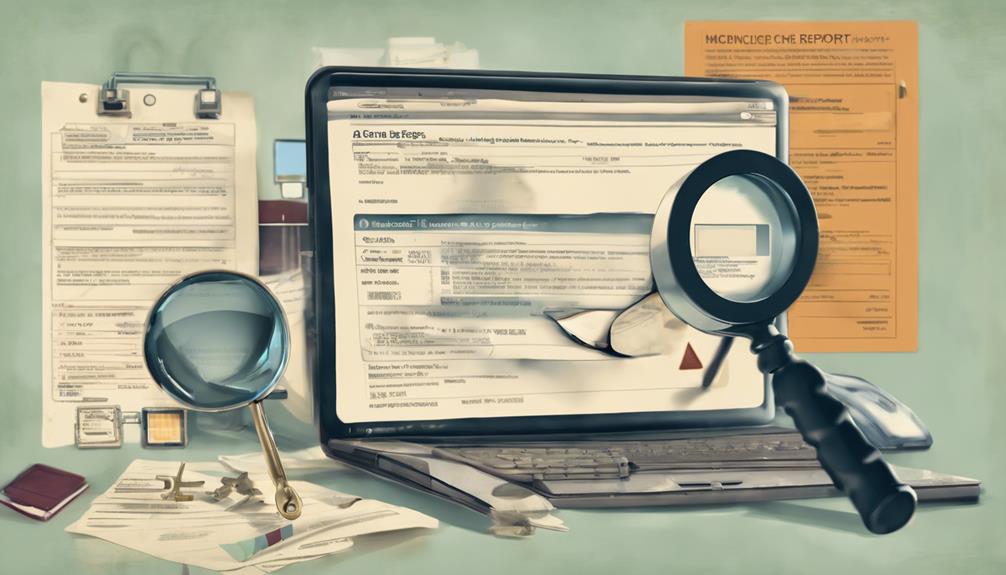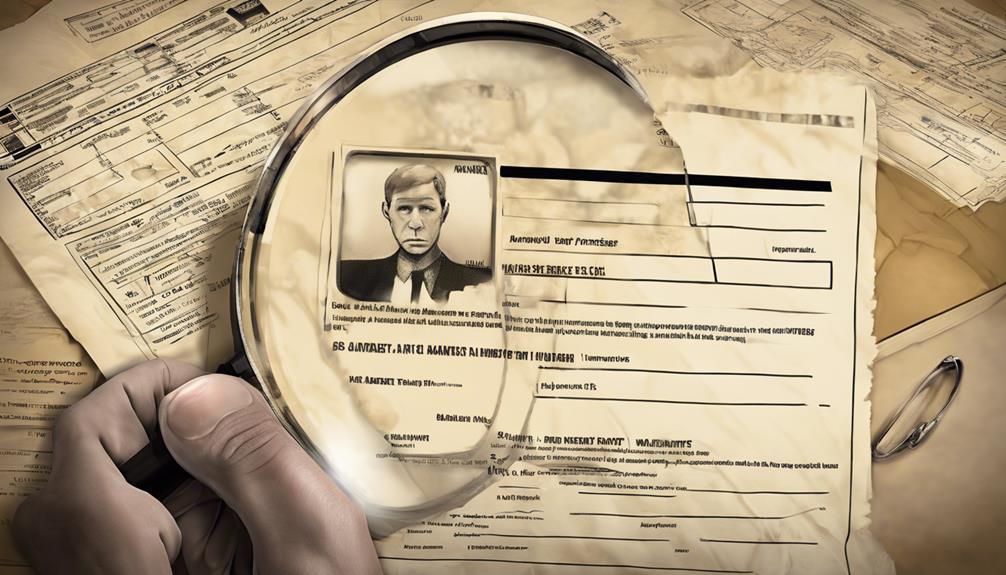Yes, charges, whether convictions, pending cases, or warrants, can show up on background checks. These findings can impact job opportunities and legal matters for individuals.
Key Takeaways
- Charges such as arrests, convictions, and pending cases can appear on background checks.
- Types of charges, including misdemeanors and felonies, may impact background check results.
- DWI charges can affect background checks and employment opportunities.
- Pending charges are visible on background checks and can influence hiring decisions.
- Awareness of expunction and nondisclosure options can mitigate the impact of charges on background checks.
Types of Charges on Background Checks

Background checks can uncover a range of charges, such as criminal convictions, pending cases, and warrants. When it comes to types of criminal charges that may appear on background checks, individuals should be aware of the potential implications. These checks can reveal a variety of offenses, including misdemeanor charges like theft, vandalism, or drug possession, which are considered less severe than felonies.
Felony charges, on the other hand, involve more serious crimes such as assault, murder, or fraud and can have a significant impact on one's record.
Moreover, background checks may also show pending criminal charges, indicating ongoing legal proceedings against an individual. Arrest records might be included in these checks, reflecting instances where a person was taken into custody by law enforcement.
Understanding the types of criminal charges that can surface on a background check is vital for individuals seeking employment, as this information can greatly influence potential job opportunities.
Impact of DWI Charges on Records
How do DWI charges in Texas affect individuals' records on background checks?
DWI charges in Texas can have a long-lasting impact on one's record when it comes to background checks. These charges, whether dismissed, resulted in a conviction, or are pending, can appear on background checks indefinitely, potentially affecting employment opportunities.
However, there are options for individuals facing DWI charges to mitigate the impact on their records. For instance, dismissed DWI charges without probation may be eligible for deletion through expunction. Additionally, in specific circumstances, DWI convictions can be sealed with an order of nondisclosure.
It's essential for individuals with DWI charges to be aware that these records can be visible to potential employers during background checks. Understanding the options available, such as expunction and nondisclosure, can help individuals navigate the implications of DWI charges on their records in Texas.
Visibility of Pending Charges

Pending charges commonly appear on employment background checks, providing insight into ongoing legal matters for candidates.
In Texas, background checks may show pending charges as part of an individual's criminal record. The visibility of pending charges can vary depending on state laws and the specific approach taken by the employer or background check provider.
When considering candidates with pending charges, employers must carefully assess the relevance of these charges to the job position and the company's policies. It's vital for candidates to be transparent about any pending charges and be prepared to discuss them during the hiring process.
Employers should handle the presence of pending charges on background checks with sensitivity and in accordance with legal guidelines. Discriminatory practices based on pending charges should be avoided, and decisions should be made based on legitimate job-related reasons.
Employment Screening Laws
Employment screening laws, including the Fair Credit Reporting Act (FCRA), set guidelines for the use of background checks in making hiring decisions. These laws aim to guarantee that background checks are conducted fairly and in compliance with regulations.
The Equal Employment Opportunity Commission (EEOC) enforces Title VII of the Civil Rights Act, which prohibits discrimination based on criminal records revealed in background checks. State laws also play an essential role, as they may dictate what information can be reported in background checks, highlighting the importance of adherence to specific state regulations.
To maintain legal compliance, employers are required to obtain written consent from candidates before conducting background checks. Additionally, individuals have the right to challenge and correct any inaccurate information found in their background checks under employment screening laws.
Components of Background Checks

Background checks encompass a range of essential components like arrest record visibility, the expunction process overview, and prospective employer awareness. These elements play a pivotal role in providing a thorough assessment of an individual's background.
Understanding how these components interplay is important for ensuring accurate and informed decision-making in the hiring process.
Arrest Record Visibility
Arrest records, detailing past legal involvement, are a crucial part of background checks, offering a detailed overview of an individual's criminal history.
Employers may access arrest records, including charges that were filed, even if they were later dismissed.
Background checks cover arrests, convictions, court records, and warrants, presenting a thorough picture of an individual's criminal background.
The visibility of arrest records on background checks can greatly impact employment opportunities, as employers consider a candidate's legal history.
Understanding the components of background checks, such as arrest record visibility, enables individuals to anticipate what information potential employers might discover.
Given the impact arrest records can have on employment prospects, individuals should be aware of what these records entail and how they might be perceived by those conducting background checks.
Being informed about the inclusion of arrest records in background checks allows individuals to prepare adequately and address any concerns employers may have regarding their past legal involvement.
Expunction Process Overview
Considering the importance of expunction in clearing one's criminal history from background checks, understanding the procedural overview of this process is vital for individuals seeking to move forward with a clean record.
The expunction process typically involves filing a petition through a criminal defense lawyer and obtaining a judge's approval. This legal remedy allows for the removal of past arrests from public record, including dismissed charges. Once expunction is granted, individuals can legally deny any past arrests that have been expunged on job applications.
Expunction plays a pivotal role in clearing one's criminal history from public databases and background checks, providing a fresh start by eliminating dismissed charges. By following the necessary steps and seeking the assistance of a criminal defense lawyer, individuals can navigate the expunction process effectively to make sure that their past arrests don't appear on future background checks.
Prospective Employer Awareness
When employers conduct background checks, they have visibility into various aspects of an individual's history, including arrest records and other pertinent details. Prospective employers are privy to a range of information that can influence their hiring decisions.
Here are some key points regarding prospective employer awareness in background checks:
- Charges: Employers can see both pending and past charges on a background check, even if the charges were ultimately dismissed.
- Background Checks: These screenings encompass criminal history details such as arrests, convictions, and court records.
- Court Records: Information from court records plays a vital role in background checks, providing insight into legal matters related to the individual.
- Consideration: Prospective employers often evaluate the nature of charges and their significance to the job when examining background check results.
Being aware of what prospective employers can access in a background check allows individuals to prepare and address any concerns that may arise during the hiring process.
Handling Pending Charges in Texas
Employers in Texas must consider pending charges when evaluating candidates during background checks.
Pending charges are part of a candidate's criminal record and can influence hiring decisions.
It's essential for employers to carefully assess the visibility and potential impact of pending charges on their evaluation criteria.
Pending Charge Visibility
Regularly, pending charges in Texas background checks must be thoroughly assessed to guarantee compliance with legal requirements and make informed hiring decisions. When handling pending charges in background checks, employers should consider the following:
- Understanding of Pending Charges: Pending charges refer to prosecutor-filed charges awaiting resolution in court, without a plea agreement or trial outcome yet.
- Visibility Factors: The visibility of pending charges on background checks varies based on state laws, search type, and the severity of the charge.
- Employer Responsibilities: Employers must verify the accuracy of criminal record information, assess pending charges in the context of the job, and adhere to EEOC guidance to prevent discrimination.
- Legal Compliance: Ensuring legal compliance when dealing with pending charges is essential for making well-informed hiring decisions. Consultation with legal experts can aid employers in managing this process effectively.
Employer Evaluation Criteria
Understanding how employers in Texas evaluate pending charges involves considering various factors such as relevance to the job, recency, severity, and potential impact on workplace safety. Employers evaluate pending charges based on the nature of the offense, job responsibilities, time elapsed since the charge, and the candidate's explanation.
They may also consider industry standards, legal requirements, company policies, and potential risks associated with the charges. Candidates should be prepared to provide context, updates on the case status, and demonstrate positive changes or rehabilitation efforts.
It's essential for employers to handle pending charges ethically, fairly, and in compliance with federal and state laws to avoid discrimination or legal repercussions. By adhering to proper employer evaluation criteria, companies in Texas can make informed decisions when assessing candidates with pending charges, ensuring a fair and lawful hiring process.
Understanding Criminal Charges

Criminal charges on background checks can have significant implications for individuals seeking employment opportunities. Understanding the nuances of how criminal charges are reflected in background checks is essential for job seekers.
Here are some key points to take into account:
- Types of Charges: Background checks may reveal various kinds of criminal charges, including arrests, convictions, and pending charges.
- Pending Criminal Charges: Background checks might show pending criminal charges that are still unresolved, which could impact a candidate's job prospects.
- Dismissed Charges: Even if charges were dismissed, they might still appear on a background check if they weren't expunged from the individual's record.
- Significance for Job Seekers: Job seekers should be aware of how criminal charges can impact their chances of securing employment and be prepared to address any concerns that potential employers may have regarding their background.
Employer Considerations on Charges
Employers evaluating candidates for job positions often take into account the nature and severity of any charges revealed during background checks. Pending charges, although not convictions, can influence hiring decisions. Employers must adhere to Equal Employment Opportunity Commission (EEOC) guidelines to ensure fair treatment of candidates with pending charges. It is essential for candidates with pending charges to be prepared to provide context and explanations to potential employers. Before making a hiring decision, employers may assess the relevance of pending charges to the job position. This consideration is crucial in determining whether the charges pose a risk or conflict with the responsibilities of the role.
| Employer Considerations on Charges | |
|---|---|
| Pending Charges | Hiring Decisions |
| Nature and Severity | Relevance to Position |
| EEOC Guidelines | Context from Candidates |
Legal Remedies for Background Check Results

Seeking legal remedies such as expunction offers individuals the opportunity to remove dismissed charges from public record, thereby preventing them from appearing on background checks in Texas.
When considering legal actions for background check results, individuals should be aware of the following:
- Expunction Benefits: Expunction allows for the complete removal of dismissed charges from public databases, ensuring they don't show up on background checks.
- Legal Process: The expunction process involves filing a petition, attending a court hearing, and obtaining a judge's approval before the records can be cleared.
- Impact on Job Applications: After expunction is granted for dismissed charges, individuals can legally deny any past arrests on job applications.
- Clean Slate: Expunction provides individuals with a clean criminal record by making expunged records inaccessible to potential employers conducting background checks.
Frequently Asked Questions
Do Pending Charges Show up on Background Checks in Texas?
Pending charges in Texas will generally appear on background checks conducted by employers. Employers might view pending criminal charges as part of a candidate's criminal history, potentially impacting employment decisions. Handling pending charges carefully is essential to avoid issues.
Do Pending Charges Show up on a Background Check in Michigan?
In Michigan, do pending charges reflect on background checks? Employers may see pending charges depending on the check type and charge severity. Candidates can dispute inaccuracies and explain to potential employers, ensuring fair assessment.
Do Pending Charges Show up on a Background Check in Ny?
Pending charges in New York can show up on background checks, allowing employers to access ongoing legal proceedings. Candidates should address these charges proactively to provide context. Employers may consider pending charges when evaluating suitability for a position.
What Does a Background Check Show in Texas?
In Texas, background checks reveal criminal records, including arrests and court outcomes. Employers can access pending charges info. Education, employment, and credit history may also be included. Knowing this helps candidates prepare for job screenings.
Can Misdemeanors Affect the Outcome of a Background Check?
Yes, misdemeanors on background checks can affect the outcome. Employers often consider the nature and severity of the offense, how long ago it occurred, and how it relates to the job. Some companies may exclude candidates with certain misdemeanors, while others may be more lenient.
Conclusion
To wrap up, charges certainly do appear on background checks! It's like shining a spotlight on a person's past, revealing every misstep and mistake they've made.
So, it's important to address any pending charges head-on and be prepared to explain them to potential employers. Remember, the truth always comes to light, whether you like it or not.









